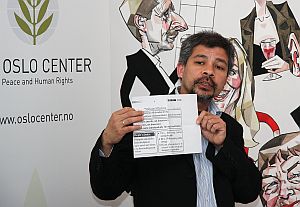This was the main message from Aung San Suu Kyi’s U.S. lawyer Jared Genser, Nang Seng  (Burma Campaign UK), Aye Chan Naing (chief editor of Democratic Voice of Burma) and the Secretary of State Gry Larsen from the Norwegian Foreign Ministry. The panellists gave their accounts of the challenges and opportunities which the election can bring.
(Burma Campaign UK), Aye Chan Naing (chief editor of Democratic Voice of Burma) and the Secretary of State Gry Larsen from the Norwegian Foreign Ministry. The panellists gave their accounts of the challenges and opportunities which the election can bring.
We must be realistic
“We are in a critical phase in Burma’s history. The Burmese people are invited to vote in an election for the first time since 1990. But we must be realistic. The election is based on ground rules that favour the military junta, and will thus not be free and fair”, said Kjell Magne Bondevik in his introduction.
State Secretary Gry Larsen, who had just returned from Burma, shared her views on the upcoming election.
“It is important to have a broad approach to the problems in Burma. While we support the sanctions, Norway has also decided to strengthen the dialogue with the military junta and other actors in the country”, said Larsen.
She emphasised how a small country like Norway could contribute to positive developments in Burma. “We must enter into dialogue with a broad number of actors in the country, including the government. The best way to influence someone is to talk with leaders face to face”, said Gry Larsen whilst sharing her experiences from her recent visit to Burma.
country, including the government. The best way to influence someone is to talk with leaders face to face”, said Gry Larsen whilst sharing her experiences from her recent visit to Burma.
The Constitution guarantees the junta total power
A main topic at the seminar was the Constitution from 2008. Aung San Suu Kyi’s lawyer, Jared Genser, said the Constitution guarantees the junta total power.
“The new constitution is a man-made disaster. It gives all power to the military junta and the Burmese people are left powerless. The Commander-in-Chief of the junta controls the parliament, the absence of adherence to fundamental human rights is striking, and the promise by the junta to discuss increased regional autonomy is removed. Everything is controlled by the junta”, said Genser.
He also stressed that the international community must not only engage in a dialogue on humanitarian aid with the junta, but also hold the regime accountable for its actions.
 “The junta has no problem with dialogue. They want to engage in lengthy discussions on humanitarian aid, because it helps them avoid the big elephant in the room, namely, corruption and mismanagement”, concluded Genser.
“The junta has no problem with dialogue. They want to engage in lengthy discussions on humanitarian aid, because it helps them avoid the big elephant in the room, namely, corruption and mismanagement”, concluded Genser.
Nang Seng, from Burma Campaign UK, put the upcoming election in a historical and ethno-political perspective.
“Ever since Burma gained its independence, ethnic groups have taken up arms because of the government’s stringent, brutal and centralised control. The new constitution will not change this since it is not opening up for regional autonomy. The election will not bring peace or democracy to Burma. Attacks and oppression will continue even after the election”, said Nang Seng.
The role of the media
Aye Chan Naing, chief editor of Democratic Voice of Burma, emphasised the lack of freedom of the press in Burma and the important role media can play for the Burmese people and the international community. He also showed the audience how the junta, through their propaganda leaflets, tries to undermine the free media by accusing DVB and BBC for spreading hatred in Burma.
“Burmese journalists take great risks in order to get information out of the country. But it is of equal importance that the media assists in educating the Burmese people on the upcoming election and the constitution. Few people in Burma know that there will be an election this year, and the media could have provided education and the necessary information about the upcoming election, and how election processes are performed elsewhere in the world”, said Chan Naing.
know that there will be an election this year, and the media could have provided education and the necessary information about the upcoming election, and how election processes are performed elsewhere in the world”, said Chan Naing.
A need for a coherent policy
In the following debate, all panel members emphasised the importance of a more coherent international policy towards Burma, and that it is important not only to have a plan A, but also a plan B and C.
“The Burmese junta has already lost one election. They are not going take that risk again; this is clearly reflected by the new constitution. To promote change in Burma takes time, and we need to be patient. We also need more knowledge about the country. The election is a critical point in Burma’s history, but there have been many critical points like this before without achieving positive outcomes” professor and chairman of the Norwegian Burma Committee, Harald Bøckmann said when summing up.
Related links:


